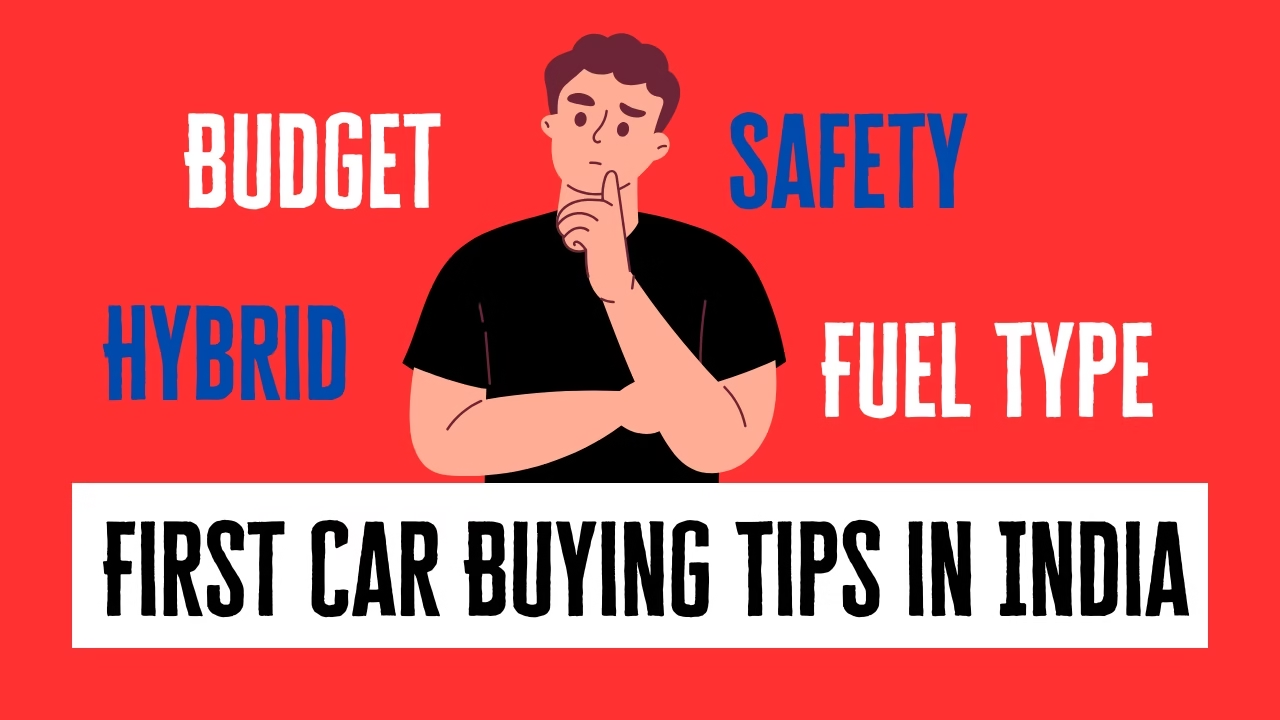Buying your first car in India is a special moment. It brings a mix of joy, freedom, and a bit of stress. There are so many models, price points, and features to think about. But don’t worry—we’ve made this beginner car buying guide just for you. Easy to understand. Straight to the point. Written with practical tips to help you choose smartly What To Buy.
Contents
- 1. Know Why You’re Buying a Car
- 2. Choose the Right Body Type
- 3. Set a Realistic Budget
- 4. New vs Used: Make a Smart Choice
- 5. Focus on Safety Over Fancy Features
- 6. Pick the Right Fuel Type
- 7. Think Ahead About Resale Value
- 8. Check the Brand’s Service Network
- 9. Plan for Maintenance Costs
- 10. Compare Models Before You Decide
- 11. Take a Test Drive & Negotiate Smart
1. Know Why You’re Buying a Car
Before checking car ads or showrooms, ask yourself:
- Will you use the car mainly in the city?
- Is it for weekend trips with friends or long drives with family?
- Will someone else in the family also use it?
Your daily use decides the right car size, fuel type, and features.
If you drive less than 20 km a day, go for a petrol car. It’s cheaper to buy and easier to maintain than diesel.
2. Choose the Right Body Type
Each car shape fits different needs:
- Hatchback – Small, easy to drive, perfect for cities. Great for beginners.
- Sedan – More space and comfort. Good for highway drives.
- SUV/MPV – Big families or rough roads? This is your pick.
Best car for first-time buyer in India?
Most start with a hatchback like the Maruti Swift or Hyundai i10. Easy to handle, budget-friendly, and widely trusted.
3. Set a Realistic Budget
Buying a car is not just about the price tag. You also need to include:
- RTO charges
- Insurance
- Service and maintenance
- Fuel or charging cost
- Loan EMIs (if any)
Rule of Thumb:
Car costs (EMI + fuel + service) should not cross 25% of your monthly income.
If you earn ₹70,000/month, total car costs should stay under ₹17,500/month.
4. New vs Used: Make a Smart Choice
New cars are safer, cleaner, and come with a warranty.
Used cars cost less and lose value slower—but you must inspect them well.
Tip for used buyers:
- Always check service history.
- Get it checked by a trusted mechanic.
- Avoid very old or heavily used models.
5. Focus on Safety Over Fancy Features
Skip the sunroof. Skip giant screens. For your first car, focus on:
- Dual airbags
- ABS (Anti-lock brakes)
- Rear parking sensors
- Strong crash-test scores
Extra options like traction control or ADAS are good if they fit your budget.
6. Pick the Right Fuel Type
Every fuel option has pros and cons:
- Petrol – Cheaper to buy, perfect for short drives.
- Diesel – Better mileage, but higher price and service cost.
- CNG – Very cheap to run, but fewer filling stations.
- Electric (EV) – Green and quiet, but charging stations are still limited.
Live in a city? Go for an automatic gearbox. Easier in traffic. A bit more expensive, but worth it for daily use.
7. Think Ahead About Resale Value
You may want to sell or upgrade your car in 3–5 years. So choose wisely.
Cars with better resale value:
- Have popular brand names (Maruti, Hyundai, Toyota)
- Are well-kept and regularly serviced
- Use petrol (diesel may drop in value faster)
8. Check the Brand’s Service Network
A car is a long-term buddy. Pick a brand that makes your life easy with:
- Nearby service centers
- Good reviews from owners
- Fair and clear pricing
This avoids last-minute surprises and high repair bills.
9. Plan for Maintenance Costs
Beyond oil changes, you’ll spend on:
- Brake pads
- Tyres
- Batteries
- Filters
Simple Advice:
Choose cars that are known to be reliable. Brands like Maruti, Toyota, and Honda are famous for fewer breakdowns.
Also, get an extended warranty for peace of mind.
10. Compare Models Before You Decide
Use car review platforms like Evfy, CarDekho, or YouTube channels to:
- Compare specs side by side
- Watch owner reviews
- Understand pros and cons
Don’t just trust the dealer. Do your homework.
11. Take a Test Drive & Negotiate Smart
Always test the car before buying. Check:
- How it feels to sit inside
- Comfort of seats and driving position
- Gear shift and brakes
- Visibility and turning radius
Negotiation Tips:
- Visit 2–3 dealers before deciding
- Ask for free accessories or discounts
- Wait for festive offers or year-end deals
Buying first car in India is a big step—but not a scary one. With this first car buying tips in India checklist, you’re all set to make a smart and safe decision.
Also Read –
Underage Driving Laws in India: Penalties, Jail Time & License Ban Explained
RC, PUC, PAN & More: Documents Required to Sell a Used Car in India
RC Transfer After Selling Your Car? Here’s What Supreme Court Says and What You Must Do
